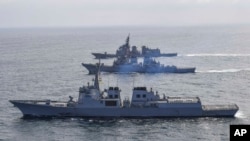White House – In return for a larger decision-making position in U.S. contingency planning within the occasion of a North Korean nuclear assault, South Korea has agreed to not pursue its personal nuclear weapons program.
The United States and South Korea are set to announce the settlement Wednesday, as President Joe Biden hosts his South Korean counterpart President Yoon Suk Yeol on the White House for a state go to to have a good time the 2 nations’ seventieth 12 months of bilateral relations and talk about the 2 allies’ future relationship.
The “Washington Declaration,” is the results of a sequence of steps negotiated over many months and designed to reaffirm U.S. deterrence commitments to the Republic of Korea, a senior administration official mentioned in a Tuesday briefing to reporters.
Under the deal, the official mentioned Seoul will “maintain its non-nuclear status and continue to abide by all the conditions of its signatory status to the Non-Proliferation Treaty.” The NPT, which South Korea ratified in 1975, prohibits states-parties from creating nuclear weapons.
The two nations may even set up the U.S. – ROK Nuclear Consultative Group (NCG), a “regular bilateral consultation mechanism that will focus on nuclear and strategic planning issues and will give our ROK allies additional insight in how we think about planning for major contingencies,” the official added. Beyond larger info sharing, Seoul can have a larger voice within the deliberations of U.S. weapons deployment, he mentioned.
The NCG mechanism is much like how the U.S. coordinated its nuclear deterrence choices with some NATO allies through the Cold War.

US-South Korea State Visit Talks to Include Deterrence Against N. Korea
Growing doubt
The U.S.-ROK Mutual Defense Treaty, signed in 1953 on the finish of the Korean War, commits Washington to assist South Korea defend itself, notably from North Korea. But as Pyongyang strikes quickly with its nuclear weapons program, together with creating missiles that may goal American cities, there was rising doubt amongst South Koreans on whether or not Washington would threat its personal security to guard Seoul and whether or not Seoul ought to proceed to depend on U.S. “extended deterrence,” a time period also called the American nuclear umbrella.
Giving South Korea a larger say in U.S. strategic deliberations is a crucial step to handle the nation’s rising sense of vulnerability within the face of a nuclear risk from Pyongyang, mentioned Scott Snyder, director of this system on U.S.-Korea coverage on the Council on Foreign Relations. Through the Washington Declaration, the Biden administration is making an attempt to exhibit that its pledge to defend South Korea is “credible and rock-solid,” Snyder instructed VOA.
In January, Yoon instructed his protection and international ministry officers that if the risk posed by North Korea “gets worse,” his nation could “introduce tactical nuclear weapons or build them on our own.”
Seoul walked again Yoon’s feedback following a world backlash. However, the narrative of South Korea having its personal nuclear deterrence functionality has turn into extra mainstream within the nation’s nationwide safety discourse.
A 2022 ballot by the Chicago Council on Global Affairs confirmed that 71% of South Koreans say their nation ought to construct its personal nuclear weapons.
 FILE – In this photograph offered by South Korea Defense Ministry, destroyers from South Korea, backside, the U.S., center, and Japan sail throughout a joint missile protection drill in worldwide waters off the east coast of Korean peninsula, April 17, 2023.
FILE – In this photograph offered by South Korea Defense Ministry, destroyers from South Korea, backside, the U.S., center, and Japan sail throughout a joint missile protection drill in worldwide waters off the east coast of Korean peninsula, April 17, 2023.
More muscular deterrence
The U.S. official mentioned the deal would imply enhanced integration of South Korean standard weapons into U.S. strategic planning, and a extra muscular method to deterrence by elevated struggle video games and deployments of navy belongings together with U.S. nuclear ballistic submarine visits to South Korea, which has not occurred because the early Nineteen Eighties.
Go Myong-hyun, a analysis fellow at Seoul’s Asan Institute for Policy Studies, a outstanding conservative suppose tank in Seoul, instructed VOA that the creation of the NCG mechanism and extra deployment of belongings will probably be thought-about a win for the Yoon authorities.
While the White House is at the moment against positioning nuclear belongings, together with tactical nuclear weapons in South Korea, common visits by a U.S. nuclear submarine quantity to “hinting at a dedicated nuclear submarine option, which could be fully fleshed out in the next round of discussions between the two allies,” Go added.
The creation of the NCG doesn’t imply the group will probably be deciding when Washington will launch nuclear strikes, one other senior administration official mentioned. She emphasised that the choice for nuclear use is “the sole authority” of the U.S. president.
China response
China, which has lengthy seen North Korea as a buffer in opposition to U.S. affect within the area, is predicted to react strongly to further deployment of U.S. belongings, notably in gentle of simmering tensions between Washington and Beijing over Taiwan and numerous different thorny points.
“We are briefing the Chinese in advance and laying out very clearly our rationale for why we are taking these steps,” the U.S. official mentioned, including that Washington has been “disappointed” Beijing has not been capable of affect its ally Pyongyang to halt its “many provocations.”
The official mentioned the administration has urged Kim Jong Un’s authorities to return to dialogue. “They have chosen not to and instead have taken a series of increasingly provocative and destabilizing steps,” he mentioned.
North Korea has carried out at the very least 13 missile launches this 12 months alone, together with three intercontinental ballistic missile launches. Pyongyang insists they’re a response to expanded U.S.-South Korea navy drills that it sees as rehearsals for an invasion.
VOA’s Anita Powell and William Gallo contributed to this report.


